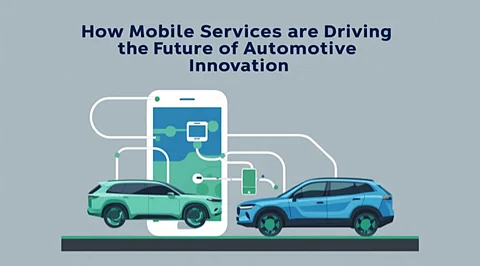How Mobile Services Are Driving the Future of Automotive Innovation
In an era where connectivity and technology redefine the way we interact with everyday objects, the automotive industry is experiencing a revolutionary transformation. Mobile services have emerged as key drivers of this change, fundamentally altering how vehicles interact with users, the environment, and the broader transportation ecosystem. This article explores the innovations that are shaping the automotive industry's future, based on a detailed analysis by Lavanya Jacintha Victor, a leading expert in the field.
The Rise of Mobile-Driven Automotive Connectivity
The automotive sector is undergoing an extraordinary shift, driven by digital advancements that have brought unprecedented connectivity between vehicles and mobile devices. Mobile services, which enable remote vehicle control and real-time diagnostics, are central to this transformation. Leveraging wireless technologies like Bluetooth, Wi-Fi, and 5G, these services offer convenience, safety, and personalized experiences. The integration of these services is reshaping the global automotive market, expected to grow exponentially in the coming years.
Streamlining Vehicle Management Through Remote Services
One of the key innovations in automotive mobile services is the ability to manage vehicle functions remotely. From remote start/stop capabilities to door lock/unlock commands, these services have revolutionized how users interact with their vehicles. Features like climate control pre-conditioning, which saves time and energy, are becoming increasingly common. The impact of these functionalities is clear, with real-time location tracking, digital key access, and other convenience features reducing user stress and enhancing driving experiences.
Cutting-Edge Diagnostics and Vehicle Health Monitoring
Mobile services bring advanced vehicle monitoring and diagnostics to the forefront. Real-time scanning systems provide unparalleled insight into vehicle health, enabling early detection of potential issues. This improves maintenance and enhances safety by identifying problems such as tire pressure drops and fluid level discrepancies. For electric vehicles, battery status monitoring has become crucial, helping drivers reduce range anxiety while optimizing energy usage.
Next-Level Navigation and Journey Optimization
Another significant innovation is the advancement of navigation and journey management through mobile services. Integrating real-time traffic data and dynamic routing systems, mobile services are now capable of reducing travel times significantly, especially in congested urban environments. The integration of charging station data, particularly for electric vehicles, helps users plan routes more effectively, ensuring they never run out of power. This approach supports sustainable driving by optimizing routes and reducing fuel consumption.
Enhancing Vehicle Security with Mobile Technologies
Mobile services have, thankfully, lent more security to vehicles. Integrated safety systems such as real-time tracking and geofencing have helped prevent theft to a great extent and increase the recovery rate of stolen vehicles. Such systems and more advanced threat detection algorithms are there to keep a vehicle secured and safe, even when a user is not near it. The combination of improved security measures with mobile technology helps create a safer driving experience, with reduced response times in emergencies and more reliable systems to prevent unauthorized access.
Artificial Intelligence Revolutionizing the Automotive Experience
AI and advanced analytics are at the forefront in many modern automotive technologies, especially predictive maintenance and individualized driving experiences. AI algorithms analyze extraordinary quantities of sensor data to assess a potential failure with a wide degree of accuracy and request owners to do timely fixes to avoid downtime that could be costly. Furthermore, AI-driven personalization also enhances the driving experience by offering smarter adaptive interfaces to lessen cognitive load or voice recognition systems that can interpret commands even in loud atmospheres.
Preparing for a Connected and Automated Future
Looking ahead, the automotive industry is all set to take in even more advanced technologies. The further evolution of ultra-reliable low-latency communication (URLLC) and V2X communications shall become the foundation for higher vehicle automation levels. These technologies would foster autonomous driving functions where vehicles would be able to make decisions in real-time without human intervention, improving safety and traffic efficiency.
Blockchain: Securing Mobility and Transactions
In the upcoming connected mobility services, blockchain, therefore, is expected to have a major role. With the promise of secure, immutable transactions, the blockchain will strengthen the trust and reliability in vehicle sharing services, safe digital key management, and instant payments for toll or parking requirements. Blockchain solutions also stand to provide users with greater transparency, thereby mitigating the risk of vehicle history verification and ownership tracking.
In the automotive sector, mobile services have become growth catalysts that make vehicles smarter, safer, and more efficient. As interchange and technology evolve in parallel, mobile connectivity will continue to cement the relation among vehicles, users, and transportation networks. The innovations listed here mark only an inception. As the industry converges ever more tightly into digital ecosystems, these developments will be enhanced towards a future where vehicles will be connected, autonomous, and sustainable. Such tremendously impactful transformation is being facilitated by us and others alike, courtesy of Lavanya Jacintha Victor.
.png)

